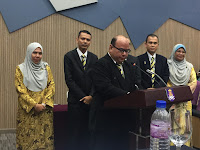
 The Accounting Research Institute (ARI) congratulates all finalists of the Vice Chancellor Quality Awards (Anugerah Kualiti Naib Cancelor or fondly known as AKNC) of Universiti Teknologi MARA. Basically, AKNC is the award for the attainment of performance excellence among the Responsibility Centres (PTJ) in UiTM highlighting their best practices.
The Accounting Research Institute (ARI) congratulates all finalists of the Vice Chancellor Quality Awards (Anugerah Kualiti Naib Cancelor or fondly known as AKNC) of Universiti Teknologi MARA. Basically, AKNC is the award for the attainment of performance excellence among the Responsibility Centres (PTJ) in UiTM highlighting their best practices. Representing the faculties are Faculty of Chemical Engineering, Faculty of Mechanical Engineering and Faculty of Electrical Engineering. The departments are represented by the Reistrar Office, the Treasury Department and the Students Affairs Department. Meanwhile, finalists from state campuses are from Perak, Pahang and Melaka.












